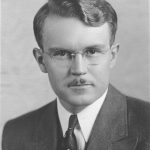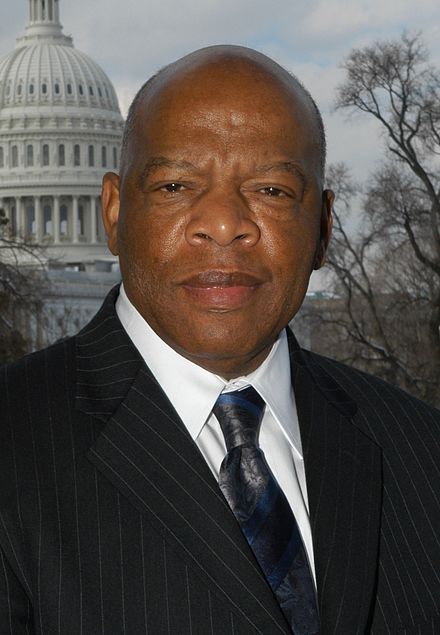John R. Lewis 1940–2020
John Lewis was a politician and civil-rights leader who served in the United States House of Representatives for Georgia’s 5th congressional district from 1987 until his death on July 17, 2020 from pancreatic cancer.
Lewis was one of the “Big Six” leaders who organized the 1963 March on Washington. He went on to hold various key roles in the civil rights movement and its actions to end legalized racial segregation in the United States. In 1965, Lewis led the first of three Selma to Montgomery marches across the Edmund Pettus Bridge. In an incident known as Bloody Sunday, armed troopers and sheriff police brutally attacked the nonviolent marchers.
Does this sound familiar?
In a NY Times essay he wrote shortly before his death, Lewis aptly reminds us to “study and learn the lessons of history because humanity has been involved in this soul-wrenching, existential struggle for a very long time.”
It’s easy for me to view John Lewis as an extraordinary person, whose many extraordinary accomplishments far exceed anything I can come close to: An excuse for me to not do my part in today’s ongoing struggle for peace and justice.
But Lewis admonishes ‘ordinary’ me. “Ordinary people with extraordinary vision can redeem the soul of America by getting in what I call good trouble, necessary trouble.”
In the words of Jonathan Reckford, CEO of Habitat for Humanity, “Congressman Lewis believed in creating good trouble — the kind of disruption that challenges the status quo and forces change. John Lewis has gone home. His work here is incomplete, but he has shown us the way. Today we mourn. Tomorrow, we make some good trouble of our own.”

John R. Schmidt 1911–2003
I’m currently conducting research on Dr. John R. Schmidt for an historical novel I am co-authoring about his life and work. Dr. John was just out of medical school and his residency in 1941, when he was called to a life of service in Paraguay, South America. Among many other contributions to justice and health in that country, he founded and ran a leprosy hospital for the outcasts and poorest of the poor.
Just now, I’m reading about the seemingly overwhelming challenges that confronted him in 1954: The Paraguayan government refused to acknowledge his medical certification, threatening to shut down his fledgling leprosy project. When Dr. John persevered, continuing to find and treat people dying of the dreaded disease, his North American sponsors shut down all funding.
Dr. John’s response: “The responsibility of the health ministry of a country is to care for the sick. We are in a country where that is not happening. Now they are reacting to us out of their guilt. We will continue our God-given command to think of and care for others.” He refused to withdraw his services, despite persistent threats against him from local communities, the Paraguayan government, his North American sponsors, and even the Mennonite community who worked with him in Paraguay. None of them could stop him. He insisted that the outcast and oppressed people of that poor country needed him.
John Schmidt made a lot of good and necessary trouble.
In 1976, Dr. Oliver Hasselblad, world leprosy expert and president of the American Leprosy Mission, credited Dr. John with pioneering home treatment for leprosy. Until then, it was thought that leprosy was so contagious that it required treatment in complete isolation. One of Dr. John’s many accomplishments was demonstrating that this degree of isolation was neither desirable nor necessary.
Thanks to Dr. John’s pioneering leadership, leprosy is treated mostly on an outpatient basis today.
It’s easy for me to view John Schmidt as an extraordinary person, whose many extraordinary accomplishments far exceed what I can possibly achieve or even come close to: Another excuse for me to not do my part in today’s struggle for peace and justice.
But Dr. John R. Schmidt was my father. I know that he was an ordinary man. An ordinary man with an extraordinary vision.
The legacies of both John R. Lewis and John R. Schmidt call me to do my part to get into good and necessary trouble to make this world a better and safer place for all.
Who calls you to action?


Without people creating good and necessary trouble no positive change comes to the world. Change, however, is uncomfortable. Given that most of us wish to avoid discomfort we frequently avoid being in the presence of others who are created good and necessary trouble. Maybe enough of us are currently uncomfortable with our world the way it is that we are willing to create the good and necessary trouble required to change it.
My biggest take-away was seeing the value in both kinds of bottom-up trouble-making. The civil rights movement was bottom-up working to scale. John R. Lewis, MLK, and their colleagues worked to change the world. John R. Schmidt worked to change in his circle of influence, perhaps something easier for most of us to enact. So looking forward to seeing the result of your research.
Hi Terri. Actually, what John Schmidt created and pushed changed how leprosy is treated in the entire world today…but day to day, he was focused on what he could do right at that moment, right in front of him – to help the poor and the sick. I doubt that he had a grand vision of what his work would eventually accomplish – which Lewis and MLK did have – but in the end, John’s work did leave an indelible mark on the world. Interesting to think about that difference…
That’s lovely. Yes, the intentional versus that which is so powerful that explicit intention isn’t necessary.